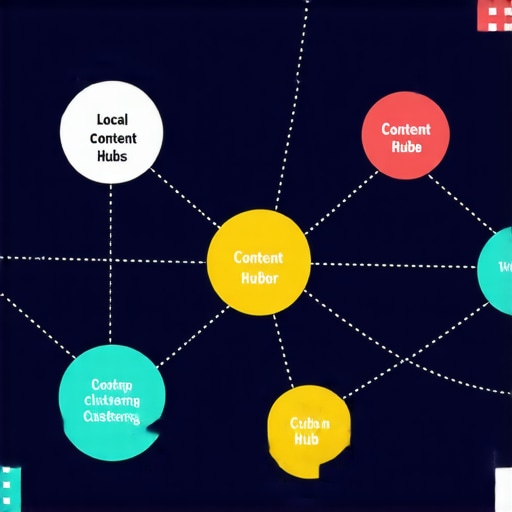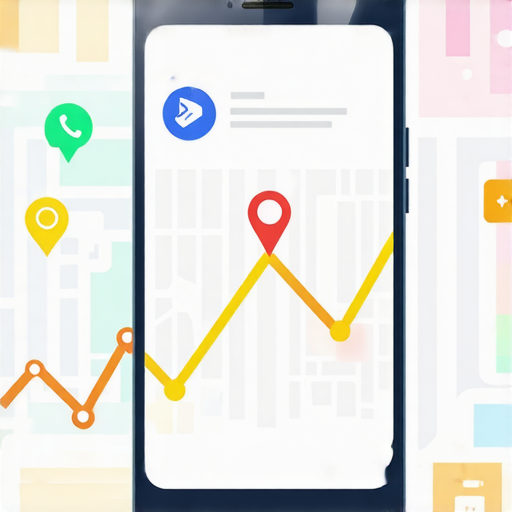Unveiling the Core of Fast Google Ranking Techniques for Local SEO Mastery in 2024
In the competitive landscape of local search, achieving rapid Google rankings demands an intricate blend of technical finesse and strategic insight. As digital marketers and local business owners strive for visibility, understanding the nuanced mechanisms that influence local SEO performance becomes paramount. This article explores sophisticated, expert-level techniques designed to accelerate your Google My Business (GMB) ranking signals and dominate local search results in 2024.
Decoding the Algorithmic Underpinnings of Local Search: Beyond Basic Optimization
The cornerstone of rapid local ranking lies in deciphering Google’s evolving algorithm, which increasingly emphasizes CTR signals, review velocity, and authoritative citations. Advanced practitioners leverage CTR signal optimization strategies to manipulate user engagement metrics ethically, fostering higher rankings. These tactics include designing compelling snippets and employing structured data markup to enhance visibility.
Harnessing Semantic SEO and Niche-Specific Content for Authority Building
To outpace competitors, content must transcend keyword stuffing and embrace semantic relevance. Implementing comprehensive, niche-specific content that addresses complex user intent—such as localized FAQs, expert insights, and case studies—fortifies your authority. Incorporating LSI keywords like “local business visibility,” “Google Maps ranking factors,” and “local SEO expert techniques” organically within your content creates a resilient semantic network that Google recognizes as authoritative.
Expert-Level Link & Citation Strategies for Accelerated Trust Signals
High-quality backlinks and citations remain critical. Advanced SEO practitioners focus on obtaining authoritative local citations from industry-specific directories and leveraging hyper-local links from community portals. These signals enhance trustworthiness and help Google associate your business with local relevance, thus boosting your rankings faster.
Can AI and Machine Learning Revolutionize Local SEO in 2024?
What are the cutting-edge AI tools and techniques that can predict and adapt to Google’s ranking shifts for local businesses?
Emerging AI-driven analytics platforms analyze user engagement patterns and predict ranking fluctuations, enabling proactive optimization. Integrating tools like semantic analyzers and intent prediction models allows marketers to tailor content and signals dynamically, maintaining a competitive edge in local search results.
For further insights, explore our ultimate guide to CTR signals for local SEO success.
Are you ready to implement these advanced strategies? Contribute your insights or ask questions and join a community of SEO professionals dedicated to mastering local search in 2024.
Utilizing User Engagement Metrics for Strategic GMB Optimization
While traditional SEO tactics focus heavily on backlinks and keyword relevance, emerging insights highlight the importance of user engagement metrics such as click-through rates, call clicks, and direction requests. These signals serve as real-time indicators of your business’s relevance and attractiveness to local searchers. Implementing structured data markup, optimizing your GMB profile for mobile responsiveness, and creating compelling snippets can significantly influence these engagement signals, ultimately impacting your rankings. For in-depth strategies, explore effective CTR signals strategies.
Advanced Local Citation Building: Beyond the Basics
Trust signals are paramount in local SEO, and high-quality citations from authoritative, niche-specific directories can propel your GMB ranking. Going beyond generic listings, targeted citations from industry associations, local chambers of commerce, and specialized review platforms add layers of credibility. These citations should be consistent in NAP (Name, Address, Phone Number) details and enriched with relevant keywords to reinforce your local relevance. For a comprehensive citation strategy, see advanced citation techniques.
Can Voice Search Optimization Transform Your Local SEO Approach in 2024?What are the most effective voice search optimization techniques that can give your local business a competitive edge in Google’s evolving search landscape?
With the rapid adoption of voice assistants, optimizing for voice search has become crucial. This involves focusing on natural language keywords, question-based queries, and conversational content that aligns with how users speak. Incorporating structured data to highlight FAQs and local business details ensures voice assistants can accurately retrieve your information. Furthermore, tracking voice search performance through platform analytics can help refine your strategy over time. For expert insights, consult voice search optimization tactics.
Have you experimented with voice search SEO? Share your experiences or ask questions in the comments to deepen your local ranking strategies.
Leveraging Data-Driven Local SEO Audits to Identify Hidden Ranking Opportunities
To truly accelerate your Google local rankings, a meticulous, data-driven approach to SEO auditing is essential. Advanced practitioners utilize comprehensive analytics tools such as SEMrush, Ahrefs, and Google Search Console to perform granular audits that uncover obscure opportunities for optimization. These audits evaluate factors like NAP consistency, local keyword saturation, and backlink profiles, revealing gaps and strengths that may not be immediately apparent. Regular audits enable the detection of fluctuations caused by algorithm updates, allowing for timely strategic adjustments that can preserve or enhance your local visibility.
What role does machine learning play in predictive local SEO analytics?
Emerging AI algorithms analyze historical ranking data and user engagement metrics to forecast future fluctuations, enabling preemptive action. Platforms such as Semrush Position Tracking incorporate machine learning to simulate potential ranking scenarios based on current optimization efforts, guiding marketers toward the most impactful adjustments. This predictive capacity transforms local SEO from reactive to proactive, ensuring sustained visibility even amid Google’s frequent algorithm shifts.
For those eager to explore these methodologies, consider integrating advanced analytic tools into your routine and stay vigilant for pattern shifts that signal algorithm changes. Continuous learning and adaptation are the cornerstones of expert-level local SEO mastery.

Innovative Local Content Clustering to Dominate Niche Markets
Beyond traditional keyword strategies, content clustering revolves around creating interconnected content hubs that address broad topics through nested, semantically related subtopics. This approach enhances topical authority and signals relevance to Google’s semantic understanding. For example, a local plumbing business might develop clusters around “emergency plumbing,” “leak repair,” and “pipe installation,” each linked internally and enriched with local keywords. This structure not only boosts on-page relevance but also encourages longer site visits, reducing bounce rates and increasing engagement metrics—factors increasingly correlated with higher rankings.
How can hyperlocal content be tailored to meet the nuanced needs of specific neighborhoods or communities?
Hyperlocal content strategies focus on community-specific insights, events, and testimonials that resonate deeply with residents. Incorporating local landmarks, neighborhood histories, and resident interviews into your content fosters authenticity and trust—key factors for local consumers. Additionally, leveraging user-generated content such as reviews and community photos can further enhance relevance and social proof, strengthening your GMB signals and organic rankings. Combining these tactics with geo-targeted keywords creates a robust local footprint that Google recognizes as contextually authoritative.
For a deeper dive into content clustering, explore authoritative resources like Moz’s comprehensive guide on content clusters. Ready to elevate your local content strategy? Engage with our community by sharing your experiences or requesting personalized advice to refine your approach.
Harnessing Predictive Analytics for Next-Level Local SEO Dominance
In the relentless pursuit of top-tier local search rankings, leveraging predictive analytics becomes a game-changer. Advanced SEO professionals employ machine learning models that analyze historical ranking fluctuations alongside user engagement metrics to forecast future algorithm shifts. Tools like Semrush Position Tracking utilize AI to simulate potential ranking scenarios, enabling preemptive strategy adjustments. This proactive approach minimizes ranking volatility and sustains visibility amidst Google’s evolving algorithms.
Decoding Google’s Semantic Indexing with Deep Content Clustering
Moving beyond traditional keyword optimization, sophisticated practitioners implement deep content clustering, creating interconnected topical hubs that demonstrate comprehensive authority. For instance, a local legal practice might develop clusters around legal consultations, client testimonials, and community outreach, all linked through semantic relationships and enriched with geo-specific keywords. This approach signals to Google a nuanced understanding of the local authority, significantly boosting rankings.
How Does Hyperlocal Content Personalization Amplify Engagement and Rankings?
Hyperlocal content personalization involves tailoring content to specific neighborhoods, integrating community landmarks, local events, and resident stories. Such content fosters authenticity and emotional resonance, encouraging user interaction and social sharing. Embedding geo-targeted keywords and leveraging user-generated content like community reviews and photos enhances relevance signals, reinforcing your GMB profile and organic visibility. This hyperlocal focus creates a robust, community-centric digital footprint that Google recognizes as highly authoritative.
What Are the Latest Innovations in Local Voice Search Optimization?
Optimizing for voice search in 2024 requires embracing natural language queries and conversational content that mirror how residents speak. Incorporating structured data for FAQs, local business details, and question-based keywords ensures voice assistants can accurately retrieve your information. Additionally, analyzing voice search analytics helps refine your approach, identifying trending questions and optimizing content accordingly. Staying ahead in voice SEO demands continuous adaptation to the evolving speech-based search landscape.
Why Is Continuous Local SEO Auditing Becoming Indispensable for Sustained Rankings?
Regular, data-driven SEO audits utilizing tools like Ahrefs and Google Search Console uncover hidden opportunities and vulnerabilities. These audits assess NAP consistency, backlink quality, local keyword saturation, and technical health, revealing gaps that may hinder performance. Incorporating machine learning insights into audits enables predictive analysis of potential ranking fluctuations, allowing for strategic preemptive adjustments. This relentless cycle of evaluation and optimization ensures your local SEO remains resilient and competitive.
What is the role of AI in refining hyperlocal content strategies for maximum engagement?
AI-driven content tools analyze community interests, trending topics, and user behavior to craft hyperlocal content that resonates deeply with target audiences. By predicting content preferences and engagement patterns, marketers can produce highly relevant articles, videos, and social posts that foster community loyalty and enhance local signals. This data-informed approach transforms hyperlocal content from generic to compelling, elevating both user engagement and search rankings.
Ready to elevate your local SEO game? Dive into these advanced strategies, experiment with predictive tools, and share your insights or questions to foster a community of expert practitioners committed to dominating local search in 2024.
Expert Insights & Advanced Considerations
1. Emphasize Semantic Clustering for Authority Building
Implementing deep content clusters around hyperlocal topics not only enhances topical authority but also aligns with Google’s semantic indexing, accelerating rankings.
2. Leverage AI-Driven Predictive Analytics
Utilize advanced AI tools like Semrush Position Tracking to forecast ranking fluctuations, enabling proactive and strategic SEO adjustments tailored for local markets.
3. Focus on Hyperlocal Content Personalization
Develop community-specific content featuring local landmarks, events, and resident stories. This fosters authenticity and strengthens local engagement signals.
4. Optimize Voice Search with Natural Language & Structured Data
Adopt conversational keywords and FAQ schema to suit voice search trends, ensuring your local business remains accessible via voice assistants.
5. Conduct Data-Driven SEO Audits Regularly
Leverage tools like Google Search Console and Ahrefs for granular audits, uncovering hidden opportunities and maintaining ranking resilience amid algorithm changes.
Curated Expert Resources
- Google Search Central Blog: Offers authoritative updates on algorithm changes and SEO best practices directly from Google.
- Moz’s Guide on Content Clusters: Provides comprehensive strategies for creating interconnected content hubs to boost topical authority.
- Semrush’s Position Tracking Tool: An AI-powered platform for forecasting ranking shifts and planning proactive SEO tactics.
- BrightLocal’s Local SEO Tools: Specializes in local citation management, review monitoring, and hyperlocal SEO strategies.
- Search Engine Journal: Delivers expert articles on the latest SEO innovations, including AI and voice search optimization.
Final Expert Perspective
Achieving rapid Google rankings in local SEO 2024 hinges on integrating semantic content clustering, leveraging predictive analytics, and continuously refining voice and hyperlocal strategies. These expert-level insights and authoritative resources empower seasoned marketers to stay ahead of the curve, ensuring sustained visibility and dominance in local search results. Engage with these advanced tactics, share your insights, or explore further resources to elevate your local SEO mastery—your next leap in search ranking success awaits.


This post offers an incredibly comprehensive overview of the advanced strategies that are shaping local SEO in 2024. I’ve been experimenting with semantic content clustering and hyperlocal content personalization, and I’ve seen firsthand how these tactics improve engagement and rankings—especially in highly competitive markets. The emphasis on predictive analytics and AI-powered insights resonates with my approach to staying ahead of algorithm shifts. One challenge I’ve faced, though, is maintaining NAP consistency across multiple niche directories while keeping the content locally relevant and engaging.
I’m curious, how do others manage to keep citations updated and coordinated without it becoming a time-intensive task? Are there particular tools or processes you’ve found effective for streamlining this? It seems that integrating AI for ongoing audits could be the next game-changer. Would love to hear thoughts on automating citation management and whether that’s feasible at scale.
This article strikes a chord, especially with the emphasis on leveraging AI and predictive analytics to stay ahead in local SEO. From my experience, integrating tools like Semrush’s Position Tracking or BrightLocal’s citation management can really streamline the process of maintaining NAP consistency across numerous directories. It’s fascinating how AI-powered audits can identify overlooked citation gaps and help prioritize efforts without overwhelming teams. However, managing real-time updates remains a challenge, particularly for rapidly growing businesses with multiple locations. Have others found effective automation workflows or tools that handle bulk updates efficiently? Also, how do you balance automation with maintaining locally relevant, personalized content that truly resonates with niche communities? It seems that combining AI insights with local engagement tactics could unlock even greater ranking potential. Would love to hear more about strategies that can help scale citation accuracy while preserving authenticity in local content.
This post really highlights how critical it is to stay ahead of Google’s evolving algorithms through advanced techniques like semantic SEO, predictive analytics, and hyperlocal content personalization. As someone who’s been experimenting with AI tools for local SEO, I’ve found that integrating these technologies can indeed give a competitive edge—especially for businesses with multiple locations. That said, maintaining NAP consistency across various local directories remains tedious without automation. I’ve recently started using a citation management platform that syncs updates across multiple platforms, which has saved me considerable time. How do others here strike a balance between automation and localized content authenticity? Are there particular strategies or tools that seamlessly integrate both for large-scale operations?
Thinking long-term, I believe combining AI-driven insights with community engagement can really boost local relevance and rankings. Looking forward to hearing others’ experiences with scaling these advanced tactics effectively.
This post really highlights the importance of integrating machine learning and predictive analytics into local SEO strategies. I’ve been experimenting with AI-driven tools like Semrush’s Position Tracking and Google’s Local Services ads, and the results have been promising, especially in terms of identifying hidden content gaps and citation inconsistencies. The challenge I see, however, is balancing automation with maintaining genuine local engagement, which is critical for rankings but often overlooked when relying heavily on tools. I’m curious how others are managing this balance: do you have a process for ensuring that automated updates and local community insights work hand-in-hand? Also, what other AI or local SEO tools have you found effective in scaling efforts without losing authenticity? It seems that the combination of smart automation and community-focused content is key to sustaining long-term growth in local search. Looking forward to hearing everyone’s strategies and experiences.
This article hits the mark on how vital it is to leverage machine learning and predictive analytics for maintaining a competitive edge in local SEO, especially as algorithms become more sophisticated. I’ve recently started integrating AI tools like Semrush’s Position Tracking to forecast fluctuations and identify emerging opportunities before they become obvious. The challenge I encounter is ensuring these automated insights translate into authentic community engagement, which remains crucial for trust and rankings. From your experience, what’s the best way to combine AI-driven data with real, local customer insights? Are there specific tactics or tools that help maintain this balance without sacrificing authenticity? I believe the long-term success in local SEO will depend on smart automation coupled with genuine community-driven content strategies, and I’d love to hear how others are approaching this in their workflows. Sharing practical examples or tools that worked well would be really helpful.